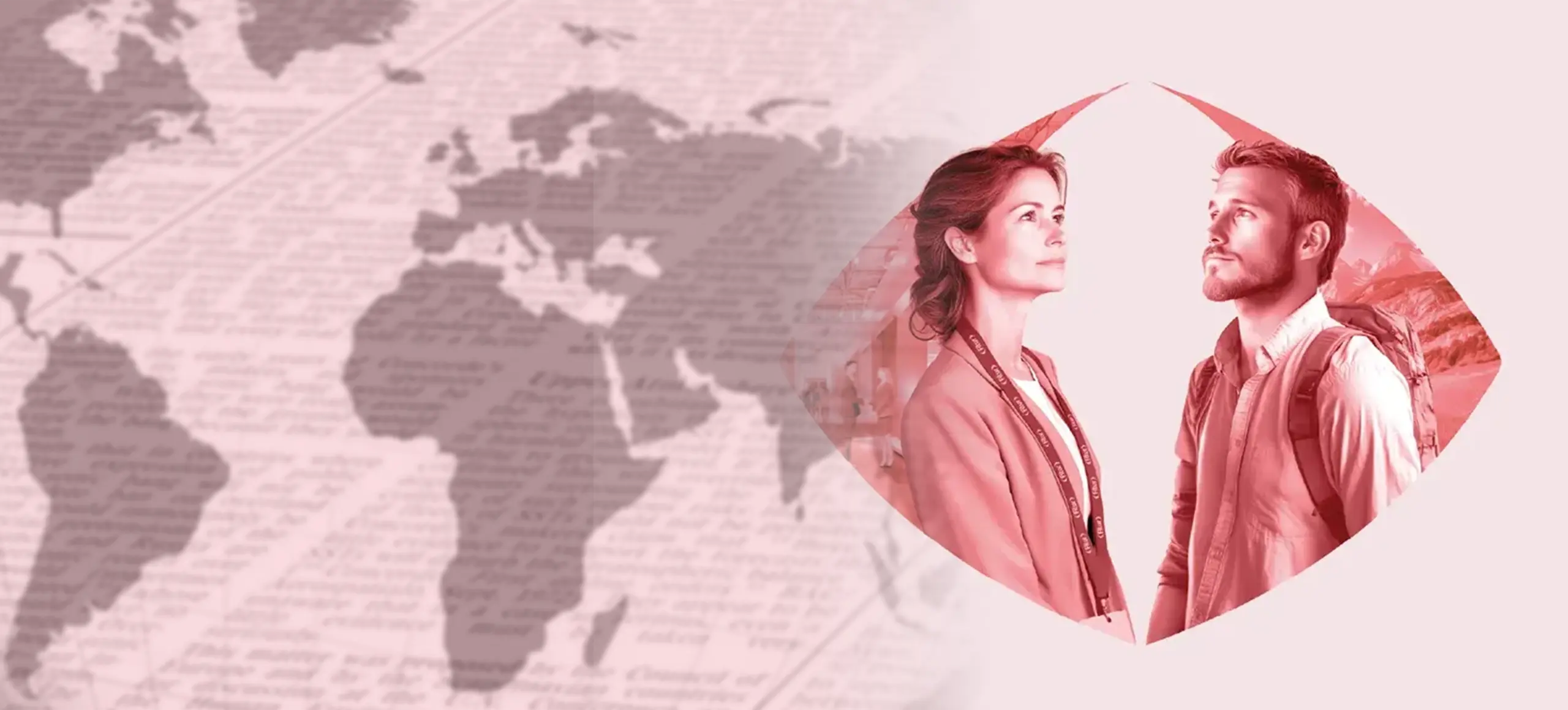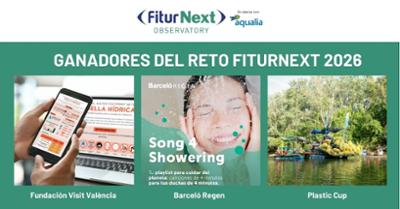

The FITURNEXT Observatory announces the winning proposals for the 2026 Challenge, focused on sustainable and responsible water management in tourism
Visit València Foundation, Barceló Regen, and Plastic Cup are the winning initiatives in the categories of Destinations and other territories, HORECA and transport sector, and Other agents in the water value chain, respectively.
Once again, FITURNEXT, the FITUR Observatory dedicated to promoting good tourism practices in terms of sustainability, has unveiled the winning proposals for the 2026 Challenge, which this year focused on how tourism can contribute to sustainable and responsible management of water and its natural environment. This new edition will once again be held in partnership with Aqualia, a leading brand in integrated water cycle management.
After analyzing more than 250 initiatives, FITURNEXT has recognized the projects of the Visit València Foundation in the Destinations and Other Territories category; Barceló Regen, in HORECA and the transport sector; and Plastic Cup in Other Agents in the Water Value Chain. These projects will be presented on January 21 at the International Tourism Fair in Madrid (FITUR), which will be held from January 21 to 25, 2026, at IFEMA MADRID.
The evaluation is carried out using the FITURNEXT Observatory's own barometers, which measure the impact and replicability of the proposals in order to identify those that offer the best response to the Challenge. In this regard, the Impact Barometer has analyzed the positive effects of each initiative on the responsible management and use of water, while the Replicability Barometer has determined the degree of maturity of the practice and its viability for application in other tourism contexts.
Winning initiatives committed to sustainable water management
The Visit València Foundation has been recognized in the Destinations and Other Territories category for its project to measure and certify the water footprint of tourism in the city. Since 2019, the Visit València Foundation has calculated and published the annual water consumption derived from tourist activity, analyzing its entire life cycle in collaboration with the Integral Water Cycle and the local tourism sector. Based on this data, the organization promotes efficiency and digitization measures to optimize the use of this resource in hotels, shops, and tourist services. Thanks to this strategy, the city has achieved a water efficiency rating of 95%, making it an international benchmark in sustainable water management in tourist destinations.
Finally, the Plastic Cup initiative has been recognized in Other Agents in the Water Value Chain for its innovative model of participatory cleaning of rivers and floodplains. The initiative turns river cleaning into a collective tourist experience where different teams compete to collect and sort the most waste while sailing in boats made from recycled bottles. This action has removed more than 400 tons of river waste and recycled more than 200, in addition to promoting environmental education, regenerative tourism, and citizen collaboration.
Finalists of the 2026 Challenge: good practices in efficient water use
In addition to the winning initiatives, nine finalist projects have been selected for the FITURNEXT 2026 Challenge that stand out for their support of sustainable water management and will be presented during the FITURNEXT 2026 program:
- Visit Benidorm has integrated water sustainability into the core of its tourism strategy, managing the water cycle through technology, water reuse, and social awareness programs to achieve peaks of 95% efficiency.
- Edificadoras de Experiencias Turísticas en Tepeixco has promoted, from a community of indigenous women in Mexico, a model of regenerative tourism that offers visitors an authentic immersion through workshops, adventures, and bio-construction to encourage responsible resource management.
- We Love Waters of Xilitla is a project that promotes sustainable tourism and environmental conservation through awareness campaigns, the development of infrastructure for efficient water use, and the promotion of the destination and its water resources.
- Can Buch presents its rural hotel, which runs entirely on renewable energy and rainwater. Its collection and purification system has enabled it to supply internal consumption and irrigation for its crops, setting an example of balance between tourism, self-sufficiency, and environmental conservation.
- Tanganyika (rainwater harvesting) in Tanzania has launched a sustainable accommodation model that guarantees access to clean water in environments without water infrastructure. The initiative recycles rainwater, uses solar energy to heat it, and has large tanks for storage.
- Basata Ecolodge was one of the first eco-lodges in Egypt to use salt water for everyday processes and reuse grey water, as well as being pioneers in the inclusion of other water efficiency measures. As a result, they have minimized freshwater consumption in a desert environment.
- Böëna Lodges has developed a comprehensive water management system that covers everything from collection and treatment to returning water to the environment in optimal conditions. Its lodgings incorporate consumption control systems and environmental education programs.
- Indico's Secret, in the Maldives, integrates a commitment to sustainability into its diving experience. Its own water purification and desalination plant has reduced the use of bottled water and improved resource management, while promoting respect for ecosystems.
- Alianza por el Agua has placed the water challenge on the political agenda in a constructive manner and generated multisectoral dialogues on this issue. In addition, thanks to its participatory interventions in the territory, it has recovered wetlands and native species.
Aqualia, which is supporting the FITURNEXT Observatory for the second consecutive year, is a leading company in integrated water cycle management, a key activity for the development of any economic, social, or environmental initiative. Aqualia's commitment and responsibility to the regions in which it operates is not limited to the provision of services, but goes further, contributing to improving the well-being of people, especially the most vulnerable groups.





